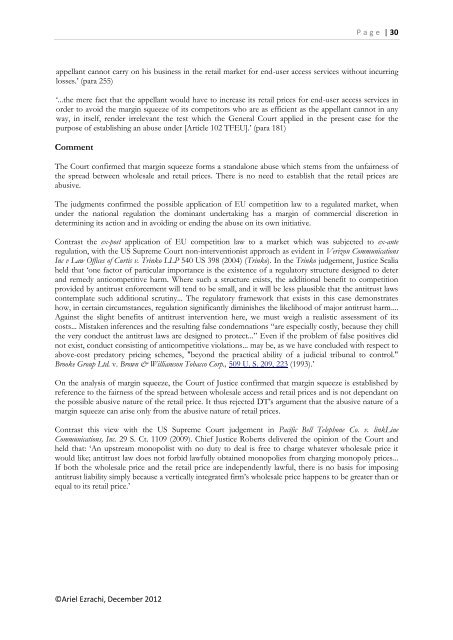EU Competition Law and Policy - compal
EU Competition Law and Policy - compal
EU Competition Law and Policy - compal
Create successful ePaper yourself
Turn your PDF publications into a flip-book with our unique Google optimized e-Paper software.
©Ariel Ezrachi, December 2012<br />
P a g e | 30<br />
appellant cannot carry on his business in the retail market for end-user access services without incurring<br />
losses.’ (para 255)<br />
‘...the mere fact that the appellant would have to increase its retail prices for end-user access services in<br />
order to avoid the margin squeeze of its competitors who are as efficient as the appellant cannot in any<br />
way, in itself, render irrelevant the test which the General Court applied in the present case for the<br />
purpose of establishing an abuse under [Article 102 TF<strong>EU</strong>].’ (para 181)<br />
Comment<br />
The Court confirmed that margin squeeze forms a st<strong>and</strong>alone abuse which stems from the unfairness of<br />
the spread between wholesale <strong>and</strong> retail prices. There is no need to establish that the retail prices are<br />
abusive.<br />
The judgments confirmed the possible application of <strong>EU</strong> competition law to a regulated market, when<br />
under the national regulation the dominant undertaking has a margin of commercial discretion in<br />
determining its action <strong>and</strong> in avoiding or ending the abuse on its own initiative.<br />
Contrast the ex-post application of <strong>EU</strong> competition law to a market which was subjected to ex-ante<br />
regulation, with the US Supreme Court non-interventionist approach as evident in Verizon Communications<br />
Inc v <strong>Law</strong> Offices of Curtis v. Trinko LLP 540 US 398 (2004) (Trinko). In the Trinko judgement, Justice Scalia<br />
held that ‘one factor of particular importance is the existence of a regulatory structure designed to deter<br />
<strong>and</strong> remedy anticompetitive harm. Where such a structure exists, the additional benefit to competition<br />
provided by antitrust enforcement will tend to be small, <strong>and</strong> it will be less plausible that the antitrust laws<br />
contemplate such additional scrutiny... The regulatory framework that exists in this case demonstrates<br />
how, in certain circumstances, regulation significantly diminishes the likelihood of major antitrust harm....<br />
Against the slight benefits of antitrust intervention here, we must weigh a realistic assessment of its<br />
costs... Mistaken inferences <strong>and</strong> the resulting false condemnations “are especially costly, because they chill<br />
the very conduct the antitrust laws are designed to protect...” Even if the problem of false positives did<br />
not exist, conduct consisting of anticompetitive violations... may be, as we have concluded with respect to<br />
above-cost predatory pricing schemes, "beyond the practical ability of a judicial tribunal to control."<br />
Brooke Group Ltd. v. Brown & Williamson Tobacco Corp., 509 U. S. 209, 223 (1993).’<br />
On the analysis of margin squeeze, the Court of Justice confirmed that margin squeeze is established by<br />
reference to the fairness of the spread between wholesale access <strong>and</strong> retail prices <strong>and</strong> is not dependant on<br />
the possible abusive nature of the retail price. It thus rejected DT’s argument that the abusive nature of a<br />
margin squeeze can arise only from the abusive nature of retail prices.<br />
Contrast this view with the US Supreme Court judgement in Pacific Bell Telephone Co. v. linkLine<br />
Communications, Inc. 29 S. Ct. 1109 (2009). Chief Justice Roberts delivered the opinion of the Court <strong>and</strong><br />
held that: ‘An upstream monopolist with no duty to deal is free to charge whatever wholesale price it<br />
would like; antitrust law does not forbid lawfully obtained monopolies from charging monopoly prices...<br />
If both the wholesale price <strong>and</strong> the retail price are independently lawful, there is no basis for imposing<br />
antitrust liability simply because a vertically integrated firm’s wholesale price happens to be greater than or<br />
equal to its retail price.’



